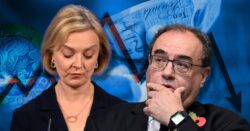The chief of the Bank of England has revealed just how close the UK came to financial chaos (Picture: PA)
Liz Truss’ economic policies pushed the UK to the brink of a potential financial meltdown, the chief of the Bank of England has said.
In a rare direct attack on government policy, Andrew Bailey revealed how he quickly came to see her £45 billion tax giveaway as a ‘very real threat to financial stability’.
By the time the Bank pledged a £65 billion intervention, four hours after September’s so-called ‘mini-budget’, his analysts feared a market rout could have been just ‘hours’ away.
Officials at the time said the move was needed to stop a ‘doom loop’ that would devastate Britain’s pensions and insurance companies, which manage trillions of pounds of people’s cash.
The threat arose as markets began to lose faith in the UK’s ability to pay back its long-term debt as they did not trust Ms Truss’ insistence that her huge tax cuts would pay for themselves through economic growth.
Investors became less willing to buy government bonds, a type of IOU the Treasury sells to raise funds.
A normally safe investment, bonds are held in large quantities by banks, pension funds and insurers, who now found them rapidly dropping in value and becoming harder to sell on.
Mr Bailey told Channel 4 News: ‘We certainly reached a point where markets were very unstable, and these were core markets, this is the Government bond market, which is in many ways the most core of all.
Ms Truss was forced to quit over the disastrous aftermath of her tax plans (Picture: Shutterstock)
‘And it was becoming unstable and it was affecting … pension funds for instance, and how they were operating.
‘And our worry was that when you get into that situation, this can easily spread very rapidly and then you have a huge job on your hands to get it back under control.
‘So we had to step in quickly and we had to step in quite decisively.’
Asked if the UK was days, even hours, away from potential total meltdown, Mr Bailey said: ‘I think at that point when we intervened, I can tell you that the messages we were getting from the markets were that it was hours.’
Mr Bailey said the last PM’s plans had threatened to devastate UK pension funds (Picture: PA)
He downplayed suggestions that a meltdown could have been as severe as the 2008 financial crash but insisted there had been ‘a very real threat to financial stability’.
Even though the new chancellor, Jeremy Hunt, has reversed most of Ms Truss’ tax cuts, the fiasco has had a lasting impact on the health of the government’s finances.
The pound has largely recovered the value it lost after the mini-budget, but the cost of public borrowing remains still higher than it was beforehand.
This is because the loss of faith on the UK’s long-term financial prospects forced the Treasury to offer a higher effective rate of interest on its bonds (known as ‘yield’) to keep up sales.
Public borrowing costs remain higher even though Rishi Sunak and Jeremy Hunt have undone most of their predecessors’ policies
Borrowing costs for the government as well as families and businesses are set to continue rising after the Bank of England raised interest rates by 0.75 percentage points to 3% on Thursday – the biggest hike since 1989.
Shadow Chancellor Rachel Reeves said families will not be able to cope with such rises ‘when we’ve got rising food prices, rising energy bills and now higher mortgage rates as well’.
Mr Hunt acknowledged Britain faces up to two years of economic challenges but pledged to ‘deliver lower mortgage rates, more jobs and long-term growth’.
The Bank is now on course to shrink its stockpile of UK bonds by one-tenth over the next year in an effort to reduce the Treasury’s dependence on what is supposed to be an independent body.
Get in touch with our news team by emailing us at webnews@metro.co.uk.
For more stories like this, check our news page.
The chief of the Bank of England has revealed just how close the UK came to a rout that could have devastated people’s pensions and savings.





